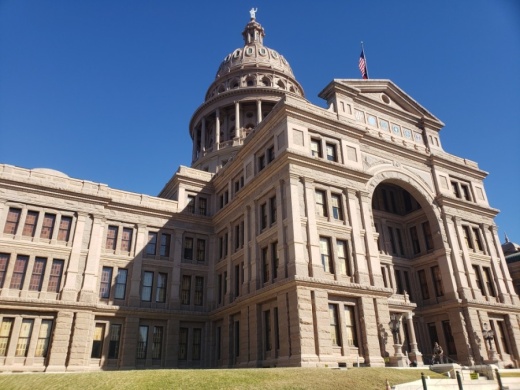This led the state to report at least 151 storm-related deaths as of April 28, including three Williamson County residents and 12 Travis County residents, according to state data.
Of the many bills, eight hold prominence as low-numbered bills—often bipartisan bills—that address energy board reforms, government communication in emergencies, preparation for extreme weather and other issues that arose in the February storm.
State Sen. Charles Schwertner, R-Georgetown, said the winter storm was similar to a Category 5 hurricane hitting all of Texas. The need to prepare and alert Texans was a glaring issue, he said.
“People started getting very nervous, and these basic forms of government—people shouldn’t have to worry about that in Texas and in the United States,” said Schwertner, who represents Williamson County and other parts of Central and East Texas.
Gov. Greg Abbott declared reform of the Electric Reliability Council of Texas to be an emergency legislative item Feb. 16 and called on the Legislature to investigate the council. ERCOT, which was largely criticized for its role in the February storm, manages the flow of electric power to more than 26 million Texas customers and represents about 90% of the state’s electric load, according to the electric nonprofit.

The first of the major bills is Senate Bill 3, authored by Schwertner. It adds winterization requirements to energy-generating infrastructure with a $1 million fine per day, he said. Municipal-owned utilities, such as in Georgetown or Austin, and energy companies, such as Pedernales Electric Cooperative or Oncor Electric Delivery, would not be treated differently.
The bill also reforms how energy entities communicate. A board would be created with members from the Public Utility Commission of Texas, ERCOT, the Texas Railroad Commission, the Texas Commission on Environment Quality and governor-appointed oil and gas industry representatives.
This is because the entities were working in silos during the storm without fluid communication, Schwertner said.
“We are very much wanting to reinvigorate the coordination and communication among market participants and regulatories to make sure this never happens again,” he said.
State senators unanimously approved SB 3 on March 29. Now it heads to the House for approval before it can be sent to Abbott for a final signature.
As the state grows, so will demand on the state’s power grid, Schwertner said. And its reliability is ever more important, particularly on the many days when temperatures reach above 100 degrees Fahrenheit.
The bill would apply to extreme heat, hurricanes or when supply and demand is unbalanced, he said.
“The most often times when you have a significant strain on the grid is every August and in the summer months,” Schwertner said.
ERCOT reform
Over two-thirds of Texans lost electricity at some point in the storm for an average of 42 hours, according to a survey from the University of Houston’s Hobby School of Public Affairs. Nearly half of all Texans lost access to running water with an average loss of 52 hours, per the survey.

To address this, the Senate passed Senate Bill 2, an ERCOT reform bill, on April 14. The bill is now under House committee consideration.
The bill increases oversight on the nonprofit that controls the state’s power grid and reforms ERCOT’s board, including requiring its members to live in Texas.
This was previously an issue as five of the 16 members did not reside in Texas when the storm hit, according to other news reports.
The governor would also appoint the board chair and the board’s unaffiliated members; the Senate would approve the governor’s selections.
According to the survey, 74% of Texans disapproved of ERCOT’s performance during the winter storm.
SB 2 passed the day after ERCOT announced it may enter into emergency conditions April 13 as a result of facilities offline for maintenance and higher-than-expected temperatures and demand. No outages were needed at that time.
“This week’s conservation alert reinforces the fact that Texans need and deserve a comprehensive legislative response that keeps our eye on the main goal: real reliability,” State Sen. Kelly Hancock, R-North Richland Hills, said in an April 14 release. “We can’t afford to get this wrong.”
Other storm bills include SB 2154, which is similar to SB 2 in that it reforms the Public Utility Commission, the entity that oversees ERCOT and regulates telecommunication and other utilities.
The bill, authored by Schwertner, would require the commission to have five members, an increase from three members, and requires members to be Texas residents.
“It really starts at the top,” Schwertner said. “With good leadership, you can get through a lot of crises.”
Local legislation
State Rep. John Bucy III—D-Austin—said what was most encouraging during the storm was how neighbors went door to door checking on neighbors in his district, which includes Cedar Park, Leander and part of Northwest Austin.
With this neighborly spirit in mind, Bucy said he filed House Bill 3711, which creates a voluntary list of people with medical conditions for local authorities to check on during emergency events.
Medically fragile people include those with Alzheimer’s disease or people who depend on oxygen treatment or dialysis, the bill states.
“It’s just the idea that Texans showed us that we believe in checking on one another and taking care of one another,” he said. “And this is a way for the government to do that as well.”
Bucy said he was supportive of several House bills related to the storm including HB 12, for example, which creates a statewide alert system.
“One of the things we really saw was concern from people who just didn’t know what was going on—a lack of communication,” Bucy said.
State Rep. James Talarico—D-Round Rock—said he was supportive of all the House bills related to the storm, including HB 10, 11, 12, 13, 16 and 17. He said they are good steps, but he is unsure if they go far enough into the issues of a deregulated, privatized energy market.
He wants to address the root of the problem—climate change, he said.
“I’m concerned that these measures are too little, too late. I think Texas got a glimpse of what we may see in the future with ERCOT having trouble maintaining the integrity of the grid,” he said in reference to the April 13 messages from ERCOT.
 Talarico said he filed a storm-related bill that adds on-site solar energy use and storage at public schools so they can become emergency management centers.
Talarico said he filed a storm-related bill that adds on-site solar energy use and storage at public schools so they can become emergency management centers.Through a grant and loan program, he said schools can serve their neighborhoods and allow people to charge phones, find warmth or provide energy to equipment for people with disabilities.
“Renewable energy is reliable if it’s equipped to be reliable,” he said.
The 87th Legislature’s last day is May 31. Talarico said he expects the Legislature to work on bills next session to go further than current reform bills have gone.
Schwertner is hopeful that bills, such as his, will help communicate, react and prepare better for future emergencies.
“We take great pride in our energy resources. Texans should not have to worry about the supply of electricity,” Schwertner said. “Unfortunately, that storm showed that we have significant deficiencies that need to be addressed, and I’m doing my best to try to address them.”





